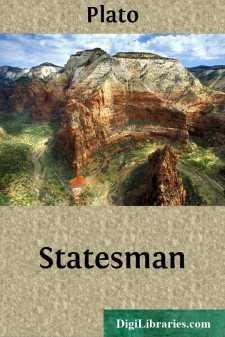Categories
- Antiques & Collectibles 13
- Architecture 36
- Art 48
- Bibles 22
- Biography & Autobiography 813
- Body, Mind & Spirit 142
- Business & Economics 28
- Children's Books 15
- Children's Fiction 12
- Computers 4
- Cooking 94
- Crafts & Hobbies 4
- Drama 346
- Education 46
- Family & Relationships 57
- Fiction 11828
- Games 19
- Gardening 17
- Health & Fitness 34
- History 1377
- House & Home 1
- Humor 147
- Juvenile Fiction 1873
- Juvenile Nonfiction 202
- Language Arts & Disciplines 88
- Law 16
- Literary Collections 686
- Literary Criticism 179
- Mathematics 13
- Medical 41
- Music 40
- Nature 179
- Non-Classifiable 1768
- Performing Arts 7
- Periodicals 1453
- Philosophy 64
- Photography 2
- Poetry 896
- Political Science 203
- Psychology 42
- Reference 154
- Religion 513
- Science 126
- Self-Help 84
- Social Science 81
- Sports & Recreation 34
- Study Aids 3
- Technology & Engineering 59
- Transportation 23
- Travel 463
- True Crime 29
Statesman
by: Plato
Description:
Excerpt
INTRODUCTION AND ANALYSIS.
In the Phaedrus, the Republic, the Philebus, the Parmenides, and the Sophist, we may observe the tendency of Plato to combine two or more subjects or different aspects of the same subject in a single dialogue. In the Sophist and Statesman especially we note that the discussion is partly regarded as an illustration of method, and that analogies are brought from afar which throw light on the main subject. And in his later writings generally we further remark a decline of style, and of dramatic power; the characters excite little or no interest, and the digressions are apt to overlay the main thesis; there is not the 'callida junctura' of an artistic whole. Both the serious discussions and the jests are sometimes out of place. The invincible Socrates is withdrawn from view; and new foes begin to appear under old names. Plato is now chiefly concerned, not with the original Sophist, but with the sophistry of the schools of philosophy, which are making reasoning impossible; and is driven by them out of the regions of transcendental speculation back into the path of common sense. A logical or psychological phase takes the place of the doctrine of Ideas in his mind. He is constantly dwelling on the importance of regular classification, and of not putting words in the place of things. He has banished the poets, and is beginning to use a technical language. He is bitter and satirical, and seems to be sadly conscious of the realities of human life. Yet the ideal glory of the Platonic philosophy is not extinguished. He is still looking for a city in which kings are either philosophers or gods (compare Laws).
The Statesman has lost the grace and beauty of the earlier dialogues. The mind of the writer seems to be so overpowered in the effort of thought as to impair his style; at least his gift of expression does not keep up with the increasing difficulty of his theme. The idea of the king or statesman and the illustration of method are connected, not like the love and rhetoric of the Phaedrus, by 'little invisible pegs,' but in a confused and inartistic manner, which fails to produce any impression of a whole on the mind of the reader. Plato apologizes for his tediousness, and acknowledges that the improvement of his audience has been his only aim in some of his digressions. His own image may be used as a motto of his style: like an inexpert statuary he has made the figure or outline too large, and is unable to give the proper colours or proportions to his work. He makes mistakes only to correct them—this seems to be his way of drawing attention to common dialectical errors. The Eleatic stranger, here, as in the Sophist, has no appropriate character, and appears only as the expositor of a political ideal, in the delineation of which he is frequently interrupted by purely logical illustrations. The younger Socrates resembles his namesake in nothing but a name. The dramatic character is so completely forgotten, that a special reference is twice made to discussions in the Sophist; and this, perhaps, is the strongest ground which can be urged for doubting the genuineness of the work....



